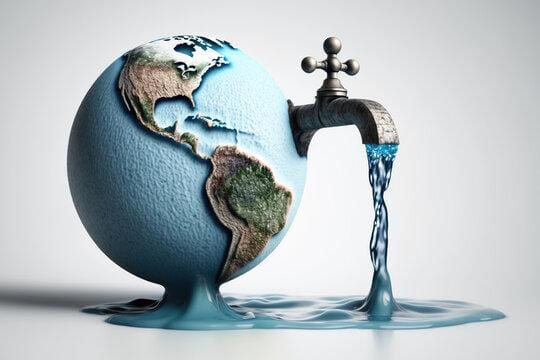In Summary
- Wastewater treatment remains an area of growth, with a few pioneering nations already achieving over 70% coverage, showing that high performance is attainable and setting the standard for others to follow.
- High AIDI scores highlight a country’s long-term dedication to infrastructure development, even when recent data may be limited. These scores reflect strategic vision and consistent investment over time.
- Countries like Egypt, Tunisia, and Algeria demonstrate how strong national planning can drive real, measurable progress, proving that when infrastructure is prioritized, tangible improvements follow.
- Small island nations such as Seychelles show how focused governance and well-managed populations can lead to high-impact results in water and sanitation access, offering a model of efficiency and effectiveness.
Africa’s water and sanitation crisis often makes headlines—but what about the wins? In 2025, several African countries have made remarkable progress in securing clean water and proper sanitation for their people. Through forward-thinking policies, strategic investments, and environmental planning, these nations prove that change is possible. This list ranks the top 10 African countries with the best water and sanitation systems, based on trusted indicators like the African Infrastructure Development Index (AIDI), access to safe water and sanitation, wastewater treatment, and water quality.
10. Namibia
Namibia claims the tenth spot with commendable strides in providing basic water and sanitation access. As of 2023, approximately 50% of the population has access to basic drinking water services, while about 60% lack access to basic sanitation. Despite data limitations, Namibia’s inclusion reflects its efforts to expand rural access and improve its urban infrastructure. It scores 68.33 on the AIDI Water and Sanitation Index (2018), showing a baseline commitment to improving systems.
9. Ghana
With 62.6% of urban dwellers accessing safely managed drinking water as of 2022, Ghana secures ninth place. However, its sanitation infrastructure remains a work in progress, with only 14% of the population having access as of 2010. Wastewater treatment remains low, at under 25% as of 2001. Despite these gaps, Ghana has made measurable progress, earning a score of 60.89 in the AIDI index and showing determination to tackle its sanitation issues head-on.
8. Mauritius
Mauritius earns its position despite limited data availability, thanks to an impressive water quality score of 63.3 and an AIDI Water and Sanitation Index score of 88.89 (2018). The country’s small size and well-managed systems likely contribute to its effective delivery of essential water and sanitation services, even though more updated figures are necessary for a comprehensive view.
7. South Africa
Although South Africa lacks current data for drinking water and sanitation access, it remains on the list due to its large-scale investments and infrastructural commitments. Its AIDI score of 71.37 (2018) and a water quality score of 25.5 indicate room for improvement, especially in the face of urban water crises. Still, South Africa continues to set regional benchmarks for policy innovation and infrastructure resilience.
6. Botswana
Botswana shows remarkable performance, especially with 97% of its population having access to safely managed drinking water (as of 2014). Sanitation access was 64% as of 2012, though wastewater treatment data remains unavailable. With an AIDI score of 74.93 and a water quality rating of 21.3, Botswana demonstrates a solid national commitment to water access and sanitation reform, particularly in sparsely populated areas.
5. Algeria
Algeria secures the fifth position with high wastewater treatment coverage at 76% (2022), coupled with 71% access to safe drinking water and 62% sanitation coverage. Its impressive water quality score of 62.0 and a strong AIDI index of 87.87 affirm its dedication to infrastructure modernization and public health improvement. Algeria’s efforts also reflect strategic investments in utility networks and clean energy-powered water systems.
4. Morocco
With 75% of its population accessing safely managed drinking water and 61% with proper sanitation services (2022), Morocco holds the fourth position. Wastewater treatment stands at 45%, and the country scores 49.2 for water quality. Its AIDI rating of 89.49 showcases Morocco’s long-term water policy success and investments in rural and peri-urban service delivery.
3. Tunisia
Tunisia ranks third with strong metrics across the board: 74% access to safe water, 81% access to sanitation, and 73% wastewater treatment rate (2022). It leads with a water quality score of 61.5 and scores 89.83 on the AIDI index. These achievements are thanks to its integrated water management policies, strong governance structures, and consistent focus on sustainability and innovation.
2. Egypt
Egypt takes the second spot, with 96.9% of the population enjoying safely managed drinking water and 66.2% sanitation coverage as of 2019. Its wastewater treatment rate exceeded 50% in 2023. Though its water quality score sits at 52.6, Egypt’s AIDI score of 95.77 (2018) shows comprehensive success in service delivery and national infrastructure.
1. Seychelles
Despite data unavailability for most service delivery metrics, Seychelles leads due to its outstanding AIDI Water and Sanitation Index score of 97.87 and a respectable water quality score of 54.6. These figures reflect the country’s focused environmental policies, consistent investments in sustainable water management, and success in maintaining high living standards.
https://www.africanexponent.com/top-10-african-countries-with-the-best-water-and-sanitation-systems-in-2025/


